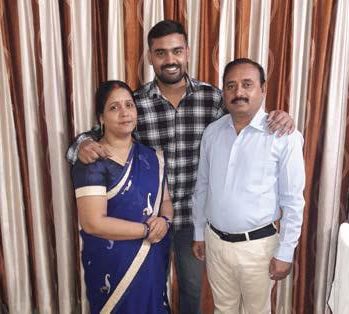BETTER THE COORDINATION,
BETTER THE EFFICIENCY
Rajesh Kumar Upadhyay,
Senior Manager QA/QC, RREC
“Operational efficiency is the result of good coordination at different management levels and among the various departments at ground level,” shares Senior Manager Rajesh Kumar Upadhyay, who is cutting his teeth at his first project, the 4‑lanning of 303 km of the Rewa-Katni-Jabalpur-Lakhnadon section of the NH‑7 in Madhya Pradesh. “River sand mining was banned in MP for a period of one and half years and considering the importance of sand in road building we have been facing a huge problem,” he says. “To overcome this issue, we are using 60% manufactured sand in the PQC mixes and since it is working well, we have overcome a big issue and are confident of completing our project in time,” he smiles a winning smile.

“Operational efficiency is the result of good coordination at different management levels and among the various departments at ground level.”
Rajesh has been involved in several initiatives at site to enhance operational efficiency that have saved the site time, cost and resources. “Like our use of geo-composite as a filter media in RE wall construction,” mentions Rajesh, ticking off the initiatives. “Secondly, our use of a geo-cell with PCC in quarter conning of culverts/PUP/VUP, partial RE wall and structures slope protection in place of stone pitching.” Some of the project team’s other initiatives include the introduction of mechanization to remove oversize material from borrowed soil and to screen river sand to separate the pebbles and clay lumps, adding 20–25% crusher waste to the RE fill material that has improved the quality of soil and, at the same time, reduced lead and cost. “We have developed special vendors for our PRW works that has worked very well apart from regular training for supervisors, engineers and workmen,” Rajesh adds.

Digitalization has started to play a key role in improving productivity for Rajesh. “DPR collection and monitoring is entirely through ‘Procube,’ our project monitoring tool, the movement of all our vehicles is now continuously tracked through GPS and we monitor plant production with IoT (Internet of Things).”
Rajesh would like to see more leaders and less bosses at L&T Construction and “training to manage egos is very important at different levels so that a conducive environment is created in which juniors can present their ideas to the seniors without fear,” he shares seriously.
“The most memorable day of my life was when we won the RKJL project,” laughs Rajesh who hails from Mirzapur, Uttar Pradesh. His better half, Snehlata is a homemaker and their son, Rishabh make up his small family. “I like reading literary and spiritual books that I get time for before going to bed every night despite my busy schedule.”

QUALITY IS A TEAM GAME
- Debasis Chand,
Senior Manager QA/QC, RREC
“I would like to create a team of individuals with each one fitting in as per his or her unique capabilities to contribute towards a common goal to increase productivity manifold and deliver the best in terms of product quality,” is Senior Manager QA/QC, Debasis Chand’s wish.
After his successful stints as Quality In-charge at the Kannur International Airport and Yadgiri-Warangal road projects, he is now hoping to realize his wish at the Bengaluru International Airport NSPR project where Debasis is involved in developing value-added mix designs, utilising cost-effective materials in concrete, asphalt, pavement mixes and creating various work method statements to defect errors. “After all,” he says, “our goal is to enhance work efficiency.”
“What is a construction job without challenges?” he grins, mentioning some of them. “It is my responsibility to synchronize all activities so that neither quality nor time are compromised and to implement a culture of quality across hierarchies.” His list of initiatives to improve operational efficiency are many. “One is of course the use of GGBS and crusher dust in the cement concrete mix and to take adequate precautions in the cement concrete pavement to prevent incidental cracks due to adverse weather conditions. Then, the use of laterite and hard rock in GSB to create a cost-effective product and deploying 3D graders and excavators at site to reduce errors.”
It is my responsibility to synchronize all activities so that neither quality nor time are compromised and to implement a culture of quality across hierarchies.
In terms of new initiatives, Debasis talks about the prefabricated user-friendly wind barricades deployed to lay PQC to prevent cracks and the solar systems to maintain curing tank temperature. “At BIAL, we are using an alumina-based curing compound to prevent shrinkage cracks in PQC especially in adverse climatic conditions where temperatures and wind velocities change frequently and due to the non-conformity in brush texturing, we have adopted tinning.”
Married to Umarani, the couple have been blessed with a son, Jaydish, who’s birth was a memorable moment in Debasis’s life. “My hobby is cooking, and I try and find time to try my hand at it,” he smiles.
“Digitalization is certainly the way to keep improving our operational efficiency,” declares Debasis, enumerating some of the several digital initiatives adopted at his site. “We use mobile applications to raise Work Inspection Requests, laser light beam technology for precise airport pavement line marking, GNSS Rovers in place of total station for coordination, checking and marking and an online portal, ACONEX for IR, NCR and approvals including source approvals, mix designs, drawings and method statements.”
